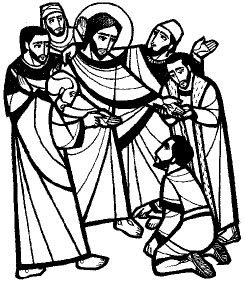II SUNDAY OF EASTER - John 20:19-31
This Second Sunday of Easter is also known as Divine Mercy Sunday. The responsorial psalm gives the tone for this Sunday's celebration:
Let the sons of Israel say:
‘His love has no end.’
Let the sons of Aaron say:
‘His love has no end.’
Let those who fear the Lord say:
‘His love has no end.’ - Psalm 118
Indeed, let us sing God’s praise, because his love is without end. During his public ministry, Jesus welcomed sinners and shared meals with them, which was considered unbecoming behaviour for a prophet. Jesus answered their criticism, quoting the prophet Hosea 6:6 by saying: “I desire mercy, and not sacrifice.” And added: “For I came not to call the righteous, but sinners.” (Mt 9:13/ 12:7). In the mercy parables, Jesus revealed the Father’s heart, a heart full of love and compassion. Being God’s children, we are called to become like him, that is, loving, compassionate and merciful. Jesus gave his disciples this commandment: “Be merciful, even as your Father is merciful.” (Lk 6:36).
This Sunday, we celebrate God’s mercy, as we hear his call to be merciful. As we experience God’s love and mercy, we are moved by His Spirit, who enables us to be merciful, forgiving those who have sinned against us. Jesus came to call sinners to repentance, assuring them of God’s merciful love.
Jesus entrusted his disciples to continue his mission: “As the Father sent me, so am I sending you.” The Church must proclaim the gospel, calling people to repentance and conversion. To carry out this mission, the disciples received the Holy Spirit from Jesus, who entrusted them with the ministry of reconciliation. Jesus gave the Church authority to forgive sins, bringing about reconciliation with God: “For those whose sins you forgive, they are forgiven; for those whose sins you retain, they are retained.” The reconciliation with God paves the way for reconciliation with others and ourselves. Reconciliation is made possible by being loved and forgiven, thus opening the way to build peace and establish a just society. Every day, as we pray to the Father, we ask: May your Kingdom come. God’s Kingdom comes whenever we do God’s will. And God, who forgives, calls us to forgive.
With Jesus’ resurrection, the power of sin and death has been defeated, and in Him we are renewed through the power of the Spirit that he granted us. Today’s gospel teaches us that the experience of the risen Lord must be done in the community of the disciples. When we withdraw from it, we lack the support found in shared love and reconciliation. Thomas went through that experience. Once back in the community to participate in the Sunday (the first day) assembly, he encountered Christ and proclaimed his faith. We must do the same profession of faith: “My Lord and my God!”


